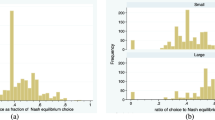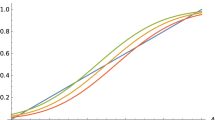Abstract.
Economic models usually assume that agents play precise best responses to others' actions. It is sometimes argued that this is a good approximation when there are many agents in the game, because if their mistakes are independent, aggregate uncertainty is small. We study a class of games in which players' payoffs depend solely on their individual actions and on the aggregate of all players' actions. We investigate whether their equilibria are affected by mistakes when the number of players becomes large. Indeed, in generic games with continuous payoff functions, independent mistakes wash out in the limit. This may not be the case if payoffs are discontinuous. As a counter-example we present the n players Nash bargaining game, as well as a large class of “free-rider games.”
Similar content being viewed by others
Author information
Authors and Affiliations
Additional information
Received: November 1997/Final version: December 1999
Rights and permissions
About this article
Cite this article
Pauzner, A. Independent mistakes in large games. Game Theory 29, 189–209 (2000). https://doi.org/10.1007/s001820000033
Issue Date:
DOI: https://doi.org/10.1007/s001820000033




